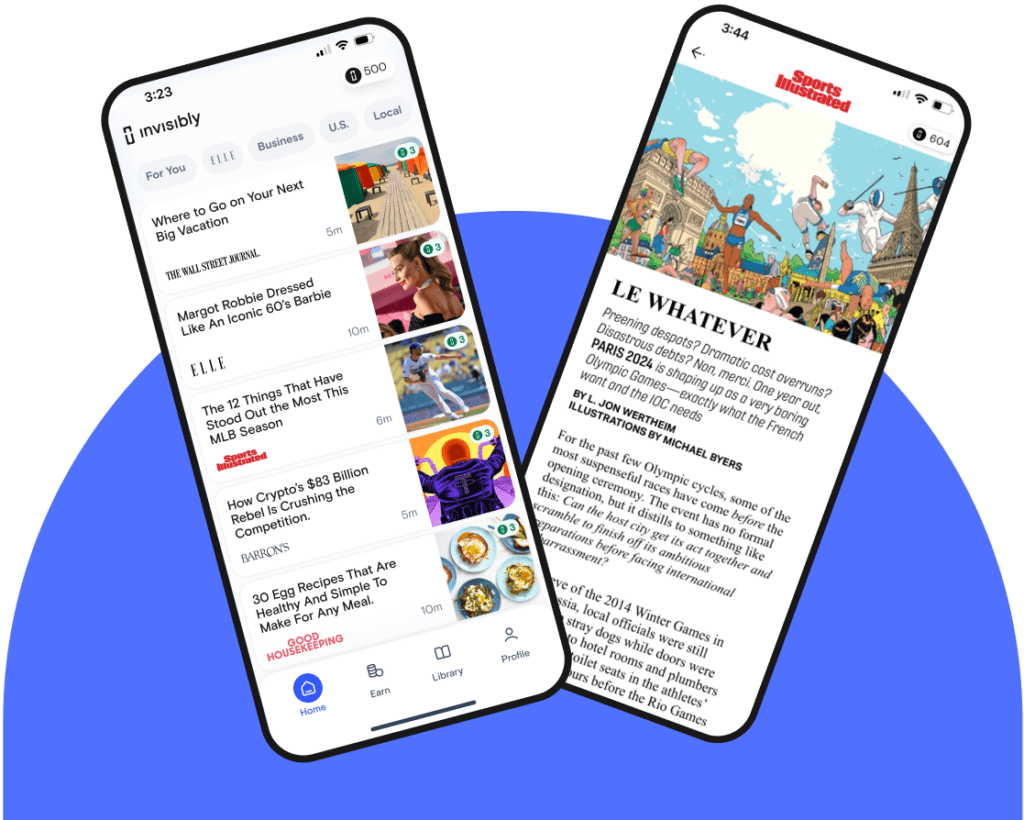Learn about the broken data economy we currently have and a path towards a new economy designed with people’s best interests at heart.
Learn about the broken data economy we currently have and a path towards a new economy designed with people’s best interests at heart.
The future of the data economy
Now more than ever, the need for fair, transparent and ethical data practices are apparent. With so many of us not knowing who has our data, it is easy to feel like you aren’t in control of your information. South by Southwest (SXSW) is an annual festival that brings together the leading creative companies and celebrates the future of media and technology. Hosted in Austin, Texas, SXSW dedicates itself to helping creative people achieve their goals in one collaborative experience. We are excited to share that Invisibly’s Founder and CEO, Jim McKelvey, will appear with Alex Kantrowitz, Founder of Big Technology, in Austin as a SXSW featured speaker to dive into the future of the data economy and the importance of putting people first.#OwnYourData
The data revolution starts here. Individuals deserve a digital economy that works for them, and with them. Invisibly believes that it’s time to become empowered by what’s yours. Big Tech needs to prioritize people, transparency, and data empowerment instead of maintaining the status quo. Our mission is to forge a clear path towards making sure that you, the individual, #OwnYourData.
The revolution we need
Time and time again data access has been denied to those who need it. The data revolution is all about putting fair practices into play so that data access is not only accessible but understandable. The term first entered our digital vocabulary in 2015 when UN Secretary-General Ban Ki-moon brought together the UN’s High Level Panel. His goal was to advise the global development of data and discuss fair use.
The data revolution intends to change the way data is handled and accessed by:
- Adjusting data production.
- Closing data gaps to prevent discrimination.
- Building data literacy.
- Modernizing data systems for transparent data collection.
These steps in turn, help promote accountability among Big Corporations to use ethical practices.
Taking back control
The facts are clear. Users have very little control over how their data is handled, processed, and used by large corporations and government entities. According to a data usage study completed by the Pew Research center, 79% of Americans say they are not too or even not at all confident that companies will admit mistakes if they compromise personal information. Furthermore, 69% of Americans report having this same lack of confidence that firms will use their personal information in ways that are ethical. As users, our comfort level with data collection practices are far from secure. Around 81% of Americans say that the potential risks they face because of data collection by companies outweigh the benefits. These risks include but are not limited to data breaches, data misuse, and data targeting. Plus, around 66% feel the same about government data collection.
Why data economy matters
The data economy is an ever growing principle that is designed to facilitate the exchange of one of our most valuable commodities — data. The purpose of the economy is to allow the exchange of data between vendors. The value of the data being exchanged all depends on how much information it provides. This data exchange is what fuels Big Tech and allows major corporations like Amazon, Facebook, and Google to make billions of dollars annually.
Considering how widely used data is and how crucial it is to Big Tech, having a fair economy is more important than ever. Yes, Big Tech harnesses the power of the data economy, but that doesn’t mean you can’t. With a fair and functioning data economy that is accessible to all, data can be used for the common good. One such way is by promoting data sharing to address social challenges. With access to information that isn’t hidden away by private entities, users can actively take part in sustainable development goals. These goals can impact community access to data regarding local education systems, crisis response, and even public health information.
Data and adaptive tech
Yet another robust advantage of a fair data economy is its application to adapting technology. Today, we are faced with rapid change. New tech is being built daily and our world moves quickly to keep up. The data economy can be used to build technology for sustainable and adaptive purposes. When the data economy is functional, it promotes collaboration via data sharing. The BCG Henderson Institute, a trusted authority in business innovation, analyzed five industry verticals:
- Industrial automation
- Precision agriculture
- Transportation
- Building automation
- Automotive industry
These five are considered to be the biggest categories in the business industry, and rightfully so. Each one affects our lives in some way — from how to deliver the safest cars, to sustainable agriculture. The BCG Henderson Institute reported that the issues businesses face in bettering these categories require data collaboration to solve. In fact, as much as 85% of cases require cross-industry data sharing and collaboration. This of course would be made possible by a fair data economy.
McKelvey’s mission
Jim McKelvey is not only the founder of Invisibly, but also the Director and Co-founder of Block (formerly Square), a service that helps millions of sellers run their business –— from secure credit card processing to point of sale solutions. He is also the author of The Innovation Stack: Building an Unbeatable Business One Crazy Idea at a Time. McKelvey started Invisibly in 2017 with a personal mission to unlock the value of peoples’ personal data.
Alex Kantrowitz will be the moderator for Jim’s SXSW session ‘The Future of the Data Economy’. He is an independent journalist and founder of Big Technology, a newsletter and podcast about Amazon, Apple, Facebook, Google, and Microsoft. His work has been referenced by dozens of major publications, from The New Yorker and The Wall Street Journal to Medium and Buzzfeed.
Own your data
Education is not only at the forefront of the data revolution, but it is also a crucial part of Invisibly’s mission. We want to empower users with an accurate understanding of data practices and allow you to own your data. Sign up now for the South by Southwest conference to learn more about our digital economy. Empower yourself by and start using Invisibly today to earn from your personal data. When you own your data, you take back control. #OwnYourData.

Invisibly
See your data work for you.



